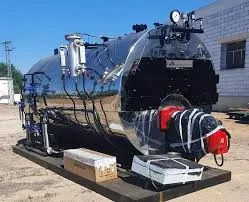
Nov . 07, 2024 01:54 Back to list
what temperature should my hot water boiler be set at
When it comes to setting the temperature for your hot water boiler, there are several factors to consider to ensure optimal performance, energy efficiency, and safety. Typically, the ideal temperature for a hot water boiler is around 140°F (60°C). However, depending on your specific needs and circumstances, this temperature can vary.
Why 140°F (60°C)?
The temperature of 140°F is often recommended for various reasons
1. Scalding Prevention Water at 140°F is hot enough to meet most household needs, such as washing dishes, doing laundry, and taking showers. At this temperature, the risk of scalding is significantly reduced when the water is mixed with cold tap water, which is a common practice. Water temperatures above 160°F can pose serious burns in just seconds, especially for children and the elderly.
2. Bacterial Growth Prevention Maintaining water at or above 140°F helps prevent the growth of bacteria, such as Legionella, which can thrive in cooler water. This temperature is particularly important for ensuring the safety of your hot water system, especially if it hasn’t been used for an extended period.
3. Energy Efficiency Setting your hot water boiler too high can result in wasted energy. Water that is heated excessively requires more energy to maintain its temperature, leading to higher utility bills. A temperature of 140°F strikes a balance between comfort, safety, and efficiency.
Factors to Consider
While 140°F is a general guideline, it’s essential to consider personal needs and conditions when setting your boiler's temperature
.1. Household Size Larger households may require hotter water to meet the demand efficiently. In such cases, you might want to consider increasing the temperature slightly, but always be cautious of scalding risks.
what temperature should my hot water boiler be set at

2. Usage Habits If you frequently use hot water for purposes like sanitizing or washing heavily soiled items, a slightly higher temperature may be beneficial. However, ensure that all users are aware of the potential risks associated with hotter water.
3. Local Codes and Regulations It's important to check any local plumbing codes and regulations that may dictate the maximum temperature for hot water systems to ensure compliance.
Adjusting the Temperature
Most modern boilers come with built-in thermostats that allow for easy adjustments. If you decide to change the temperature of your hot water boiler, follow the manufacturer’s instructions carefully. After adjusting the temperature, check the water at the taps to ensure it reaches the desired level without being overly hot.
Safety Tips
- Use Anti-Scald Devices Consider installing anti-scald devices on faucets and showerheads. These devices help regulate water temperature to prevent burns, providing an extra layer of safety. - Regular Maintenance Regularly service your hot water system to ensure it operates efficiently and safely. This includes checking for sediment buildup, which can impact performance and safety.
Conclusion
Setting the right temperature for your hot water boiler is crucial for both safety and efficiency. While 140°F is generally considered a safe and effective temperature, personal preferences, household needs, and safety precautions should guide your final decision. By balancing these factors, you can enjoy reliable hot water while minimizing risks and energy consumption.
-
Oil Fired Hot Water Boilers Sale - High Efficiency & Affordable
NewsJul.31,2025
-
High-Efficiency Commercial Oil Fired Steam Boiler for Industry
NewsJul.30,2025
-
High-Efficiency Biomass Fired Thermal Oil Boiler Solutions
NewsJul.30,2025
-
High Efficiency Gas Fired Thermal Oil Boiler for Industrial Heating
NewsJul.29,2025
-
High-Efficiency Gas Fired Hot Water Boiler for Sale – Reliable & Affordable
NewsJul.29,2025
-
High Efficiency Biomass Fired Hot Water Boiler for Industrial and Commercial Use
NewsJul.29,2025
Related PRODUCTS






















